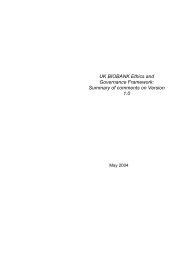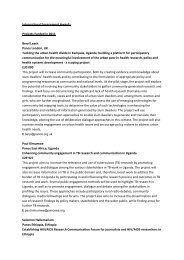Create successful ePaper yourself
Turn your PDF publications into a flip-book with our unique Google optimized e-Paper software.
12 | advancing Knowledge<br />
Missing dementia<br />
Is dementia less common in developing countries?<br />
New research suggests not.<br />
Care and the<br />
community<br />
The secret to informed consent may<br />
lie in community engagement.<br />
1 2<br />
The reported prevalence of dementia<br />
in developing countries is surprisingly<br />
low. Now, an international collaboration<br />
led by Martin Prince at the Institute of<br />
Psychiatry has found that its<br />
prevalence has been substantially<br />
underestimated in low- and middleincome<br />
countries, and that it is almost<br />
as common as in developed countries.<br />
Moreover, dementia is imposing a<br />
considerable psychological and<br />
economic burden on large numbers<br />
of carers.<br />
Professor Prince leads the 10/66<br />
Dementia Research Group, an<br />
international collaboration assessing the<br />
impact of dementia and related conditions<br />
in low- and middle-income countries. It<br />
derives its name from the fact that less<br />
than one-tenth of population-based<br />
dementia research has focused on the<br />
two-thirds or more of all people with<br />
dementia who live in developing countries.<br />
Members of the collaboration assessed<br />
almost 15 000 people over the age of 65<br />
in 11 countries, using culturally sensitive<br />
tools to factor out different perceptions<br />
of ageing and dementia.<br />
The results suggested that there is a<br />
‘hidden epidemic’ of dementia, its<br />
prevalence in urban settings in Latin<br />
America comparable to those seen in<br />
Europe and the USA. By 2040, the<br />
number of people with dementia in Latin<br />
America – more than nine million – is<br />
likely to match that in North America.<br />
Moreover, as healthcare is generally<br />
limited in such regions, patient care<br />
usually falls to spouses or other family<br />
members. Dementia is the single biggest<br />
factor contributing to dependency,<br />
creating significant economic and<br />
psychological pressures: carers are<br />
often forced to cut working hours and<br />
are at high risk of depression or other<br />
forms of mental distress.<br />
Previous underestimates may reflect the<br />
fact that people in lower-income countries<br />
are less likely to seek help for elderly<br />
relatives showing signs of dementia – it is<br />
often seen as a ‘natural’ part of ageing.<br />
The findings suggest that there is a major<br />
health burden going unaddressed in<br />
many countries. More positively,<br />
intervention studies in Russia and India<br />
carried out by the 10/66 Group (funded<br />
by the World Health Organization)<br />
suggest that simple home-based<br />
interventions can provide significant<br />
benefits to both carers and patients.<br />
Llibre Rodriguez JJ et al. Prevalence of dementia in<br />
Latin America, India, and China: a population-based<br />
cross-sectional survey. Lancet 2008;372(9637):<br />
464–74.<br />
Llibre Rodríguez J et al. The prevalence, correlates and<br />
impact of dementia in Cuba. A 10/66 Group<br />
population-based survey. Neuroepidemiology<br />
2008;31(4):243–51.<br />
Informed consent – ensuring that<br />
people who participate in research do<br />
so voluntarily and with a full awareness<br />
of what is involved – is a thorny ethical<br />
issue in developing countries. Research<br />
in Kenya and Malawi is revealing how<br />
informed consent operates in the field,<br />
and emphasising the importance of<br />
pro-active community engagement.<br />
Although often discussed, relatively little<br />
empirical research into informed consent<br />
has been carried out – a deficit being<br />
tackled by Joseph Mfutso-Bengo in<br />
Malawi and Sassy Molyneux and<br />
colleagues in Kenya.<br />
Dr Mfutso-Bengo and Dr Molyneux have<br />
explored the reasons why people do or<br />
do not volunteer to take part in trials. It is<br />
often assumed that participants believe<br />
they will benefit from the intervention<br />
being tested – the so-called therapeutic<br />
misconception. In fact, a broader<br />
motivation is a desire to access the better<br />
general healthcare often provided to<br />
participants. By contrast, discussions<br />
with community members suggested<br />
several reasons why people decline to<br />
take part in trials, including potential<br />
volunteers’ lack of awareness of health<br />
research and investigators adopting<br />
culturally insensitive practices.<br />
In Kenya, Dr Molyneux, Vicki Marsh,<br />
Dorcas Kamuya and others have focused<br />
on strengthening relations between the<br />
Images<br />
1 In Latin American countries such as Cuba, dementia may be more<br />
common than thought.<br />
2, 3 Engaging with the local community in Malawi.<br />
4 A young child in a hospital in Malawi.

















